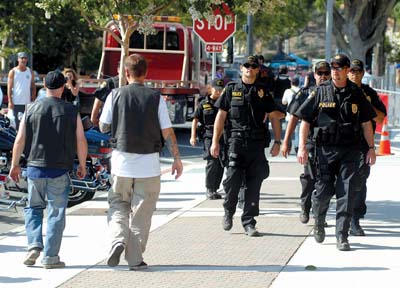
Current estimates confirmed this week by City Manager Clint
Quilter show that Hollister could lose around $200,000 on this
year’s biker rally.
HOLLISTER
Current estimates confirmed this week by City Manager Clint Quilter show that Hollister could lose around $200,000 on this year’s biker rally.
While officials attempt to liquidate remaining merchandise to offset a nearly six-figure loss so far on “official” apparel sold at the 2008 event, Quilter revealed that remaining law enforcement costs – after figuring in $40,000 in business licensing revenue and the private promoter’s agreed $200,000 contribution – come to $119,000.
Combine that with the loss on merchandise, primarily T-shirts, and the current cost to taxpayers amounts to around $215,000, according to Quilter’s figures.
This year’s approach that left Hollister in the hole was different than 2007, when promoter Horse Power Promotions raised $360,000 to pay Hollister up-front for security costs – half of which came from a private vendor who had been awarded rights to sell “official” rally merchandise.
Officials try to recoup costs
Although the city has lost more than $96,000 from rally merchandise sales, city council members are looking at ways to get some of that money back.
The complete report on merchandise sales and licensing has not been released to the public due to lack of a quorum at Monday’s council meeting – officials rescheduled it for this coming Monday.
Council member Pauline Valdivia declined to comment on the future of city sales at the rally, but she believes fewer people are showing up each year. Coupled with competition from other vendors, Valdivia “knew selling shirts would be difficult.”
She also said the economy has not helped and people who come have limits for spending money.
Even if officials canceled the sanctioned rally, Mayor Doug Emerson pointed out that there still would be costs to the city.
“A factor we need to look at is – is there any trickle down?”
Mayor wants cop costs up-front
If the city wants to continue to support the rally, a major factor in that decision might be having the money for security up-front without putting any taxpayer money at risk – the formula followed in 2007.
“(I’m) not interested in the layout or anything like that,” Emerson said. “It has to be at no cost to the city. We need the money up-front.”
Emerson said City Manager Clint Quilter is examining a company that potentially could liquidate the remaining rally shirts at cost.
“If the shirts were to be sold at cost, the city could make $85,000 to $90,000,” Emerson said.
Emerson estimated that for the non-sanctioned 2006 rally, the security costs neared $100,000. He, however, believes that number was high because it was riders who showed up on Fourth of July weekend, which required extra police.
The numbers released so far by the city break down this way:
The city has lost $96,279 on merchandise sales at the 2008 rally – a number that could decline with liquidation.
The total cost for law enforcement is estimated at $359,000.
Promoter Horse Power Promotions has agreed to pay $200,000 toward law enforcement.
The city made $40,000 in business licensing revenue at the 2008 event.
Not including losses on merchandise, the city will lose about $119,000 on law enforcement costs.









